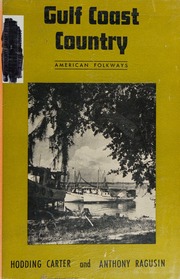

This is the seventh book in the American Folkway Series that I have read and probably the least liked. As a rule I do not care for books that have dual authors and this book was not an exception to the rule. I could find no book promos or any customer reviews at Amazon or goodreads.com so it is not very popular. Probably still in print only because it is part of the American Folkway Series.
There was a book review on the flyleaf of the book which was published in 1950. I have quoted that to give you some idea of what the book is about.
“The Gulf Coast Country is a slow Latin shrug at the harsher, more exacting morality a few miles inland.” So begins one of the finest American Folkways books, which tells the story of a region where, two hundred and fifty years ago, a handful of tough voyageurs made the first French settlement in what is now the United States. Describing this region, the authors say: “The true Coast Country begins when the traveler from New Orleans crosses the bridge over the Pearl River Swamps or when the venturer from the east discovers in Alabama’s atypical Baldwin County the happy meeting of intelligent farming and developing industry. The spirit of this narrow strip is still unquestionably Gallic, though admixed now with the congenial blood and temperaments of Mediterranean folk, Spaniard and Italian and Dalmatian and Greek, and chilled only indifferently by the coming of the sterner Anglo-American.”
The Gulf Coast Country is a land of the ghosts of men who dreamed of empire. It has been a place of seafarers for over two centuries. It is a playground whose western half is held sportive prisoner by the great Latin city of New Orleans. It is a place of strange scenic beauty, white sand and a mild, tropic sea, pine forests, low savannas stretching inland, and abiding lagoons. And it is a place, too, which today throbs to unaccustomed change; factories rise beside placid Biloxi, Mobile bustles with port life, and the smaller towns Pascagoula, Moss Point, Bay St. Louis stir with industrial determination.

Perhaps the ills of our day stem from a technological leap above real suffering and insecurity; perhaps after all, one does best to make no Promethean hurls ever upward to pure comfort and effortless existence. One finds that where these unfortunate luxuries visit the human creature, he loses romance and God, he forgets the wilderness so thoroughly that even when he is there he fails to see it. Love becomes as dry as a lawyer’s clauses, and the heart grows tired. Perhaps worst of all, he forgets his kin and their stories: he loses himself. And yet the American is ever the frontiersman; he will turn inwards unless he finds himself an unconquerable land, he will devour himself unto eternity when caged. The way I see it, this seems to describe the emergence of American leftism, post-structuralism, feminism, and the fanatical obsession with the twin Ouroboros of race and gender. The American woodsman’s great-great grandson, deprived of real suffering and wild trek, turns himself and the natural life of the world into an unsolvable problem that drives him utterly mad. To him I say: “Free yourself, my friend — away to the woods, and stay as long as it takes to remember.” Try as he may to forge into a frontier beyond his manhood, beyond his nation, beyond the sins of his ancestral past — he fundamentally remains a pioneer, and shall be imprisoned until he takes ownership of this incredible force. — Paragons Of Futility by A.M. Hickman
A fine Christmas here in Cochise County with the morning low temperature at 43°F and expecting the high to be 70. Perfect snowbird weather!